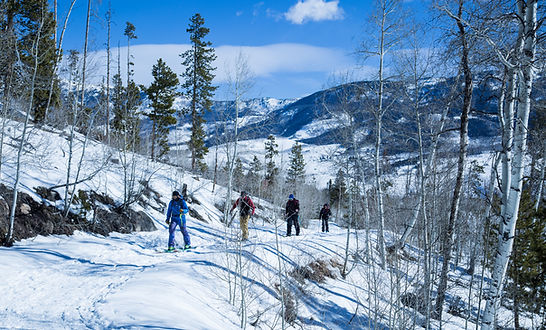BACK COUNTRY TRAVEL FAQs
WHAT IS BACKCOUNTRY travel?
Backcountry travel is an experience that takes you away from the lifts and noise of the resorts and allows you to experience the winter environment in a majestic setting. We travel in areas without avalanche control and spend our time climbing up the slopes, riding untracked powder, taking breaks to rest and enjoy the scenery, and exploring the mountains. This is backcountry at its best!

how difficult is travel in the backcountry?
Uphill travel requires a degree of physical fitness, you should be comfortable hiking at a slow to moderate pace for 45-60 minutes. To enjoy the downhill part of the trip, you should to be comfortable making turns on blue runs at a minimum. Our priority is safety and fun! We pace ourselves and typically stop for breaks every 15-30 minutes, giving everyone a chance to change clothing layers, eat snacks, sip water, and drink in the peacefulness of the backcountry.

WHAT CAN I expect from a guided trip with hcva?
We have worked with our guides to develop a trip that is suited for your ability and skill level, so the planning portion has already been taken care of. We rely on you to communicate with our guides before and during the trip, ensuring they have a thorough understanding of your skill and ability level as well as any medical concerns. Your guide will set an appropriate pace, coach you on what to wear so that you remain comfortable, provide instructions of efficient techniques and safe skiing practices for the backcountry. Feel free to ask questions, but most importantly you can rely on your guide's ability to create a safe and fun experience.

How long are the tours?
Most of our tour lengths are between an hour and three hours. There is significant flexibility based on physical fitness, weather, and current conditions. Trips can be adjusted to make sure every guest is enjoying the experience.

what equipment do i need to go on a backcountry tour?
Gear changes by activity and experience. This is a loose list of what you should bring, use the link at the bottom of this page for more information. Itmes folowee by and "*" denotes that HCVA will provide upon request. If you are missing anything else this list, let HCVA know and we can work to provide it
Winter only:
-
Snowshoes/ski/snowboard touring equipment: skis/snowboard with touring bindings, boots, collapsible poles and climbing skins*
-
Avalanche Safety Gear - (Back Country Access (BCA) T2 Avalanche Rescue Package - includes 3 antenna Tracker 2 avalanche transceiver, stealth 270 probe, and B-1 EXT shovel)*
-
Avalanche backpack for gear (Rocky Mountain Underground Core Pack 35L)*
All events:
-
Appropriate size pack
-
1 liter of water minimum
-
Sunscreen/ lip balm
-
Snacks
-
Shell jacket
-
Shell pants
-
Long underwear (synthetic or wool, NO COTTON)
-
Warm hat and gloves (preferably a light glove to hike in and another warm glove or mitten for descents and breaks)
-
Neck gaiter, balaclava or Buff
-
Sunglasses/ Goggles
-
Down or synthetic jacket (should be light enough to pack in day pack)
-
One more layer than you think you will need.
HCVA guides will additionally carry: Satcom, two-way radios, cell phone, emergency first aid kit, and general repair kit.


